In recent years, the landscape of content creation has been dramatically transformed by the emergence of AI writing tools. These innovative technologies have become powerful allies in combating writer's block and significantly boosting productivity across various industries. As businesses increasingly recognize the value of efficient content generation, AI writing assistants have evolved from simple grammar checkers to sophisticated platforms capable of generating complex, context-aware text.
The advent of AI writing tools marks a paradigm shift in how we approach the writing process. By leveraging advanced natural language processing and machine learning algorithms, these tools can analyze vast amounts of data to provide real-time suggestions, generate ideas, and even produce entire drafts. This technological leap has not only streamlined the writing workflow but has also democratized high-quality writing, making it more accessible to a broader range of professionals and content creators.
One of the key benefits of AI writing tools is their ability to overcome the dreaded writer's block. By offering prompts, expanding on ideas, and suggesting alternative phrasings, these tools serve as a constant source of inspiration and support for writers. This has proven particularly valuable in business settings, where the demand for consistent, high-quality content across various platforms is ever-increasing.
Key Players in AI Writing Assistance
The AI writing tool market has seen rapid growth, with several key players emerging as leaders in the field. Each of these platforms offers unique features and capabilities tailored to different writing needs:
1. PaperGen.ai: As a specialized AI-powered paper generator and expander, PaperGen has gained traction among academic and professional writers. Its ability to generate comprehensive outlines, expand on key points, and provide relevant citations makes it an invaluable tool for research paper writing and content development.
2. Grammarly: While primarily known for its grammar and spell-checking capabilities, Grammarly has expanded its offerings to include AI-powered writing suggestions and style improvements. Its widespread adoption across various industries has made it a household name in AI writing assistance.
3. ChatGPT: Developed by OpenAI, ChatGPT has revolutionized the concept of conversational AI. Its ability to generate human-like text based on prompts has made it a versatile tool for content creation, brainstorming, and even coding assistance.
4. ContentShake AI: This AI-powered content creation platform specializes in generating SEO-optimized articles and blog posts. Its focus on creating content that ranks well in search engines has made it popular among digital marketers and content strategists.
The adoption of these AI writing tools in businesses has been nothing short of remarkable. To illustrate this trend, let's examine the adoption rates of these popular AI writing assistants:
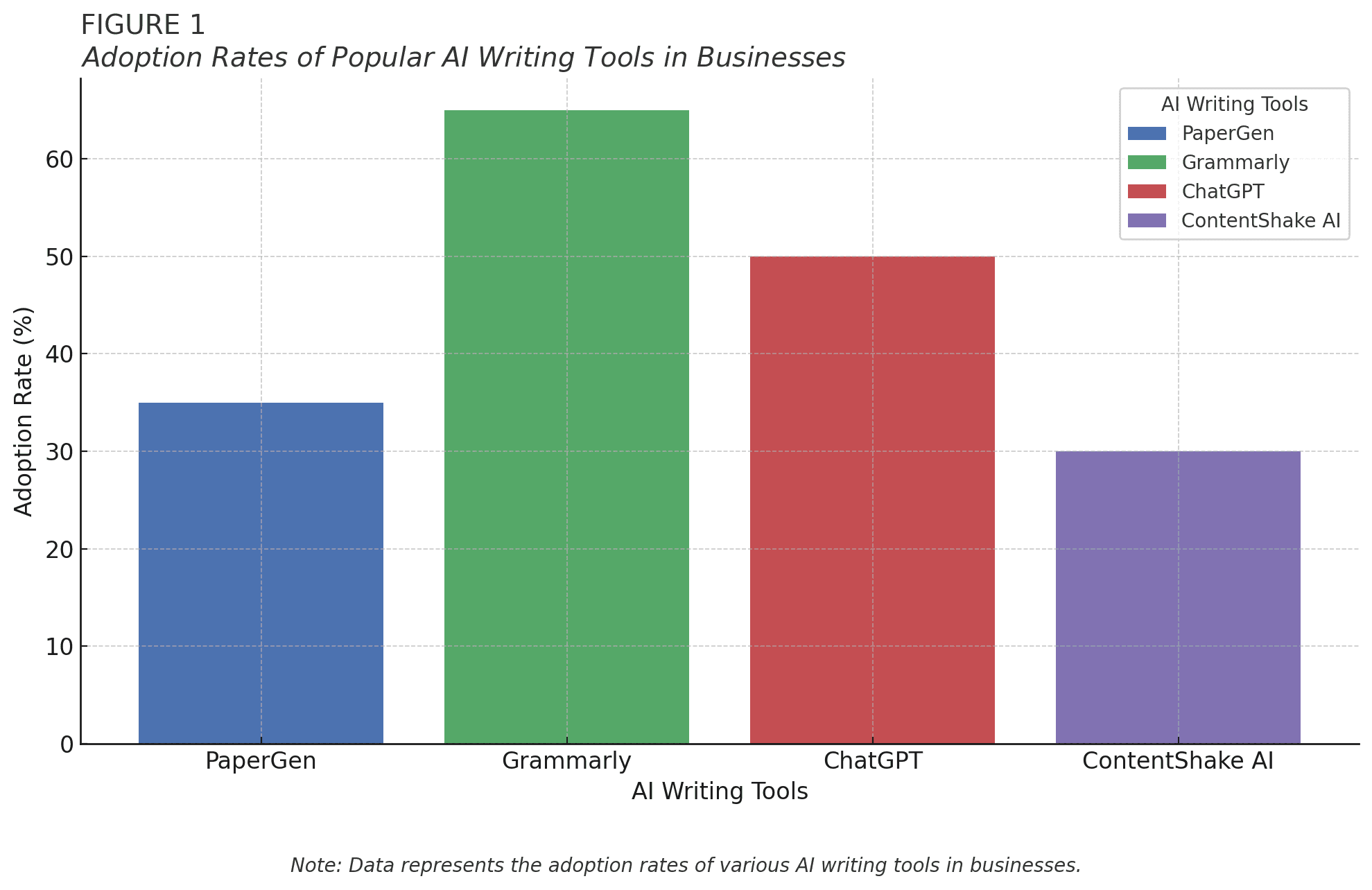
As the graph demonstrates, Grammarly leads in adoption rates, likely due to its early entry into the market and broad applicability across various writing tasks. ChatGPT follows closely, reflecting its rapid rise in popularity since its public release. PaperGen and ContentShake AI, while having lower overall adoption rates, show significant uptake in their specialized niches of academic writing and SEO content creation, respectively.
PaperGen.ai: A Comprehensive Solution
In today's fast-paced business environment, writer's block and productivity issues can significantly hinder progress. PaperGen emerges as a comprehensive solution to these challenges, offering innovative features that leverage AI technology to boost writing efficiency and quality.
Paper Generator Feature
PaperGen's paper generator is a game-changer for professionals struggling with the initial stages of writing. This feature effectively addresses the dreaded "blank page syndrome" that often leads to writer's block. By utilizing advanced natural language processing algorithms, PaperGen can generate well-structured outlines and initial drafts based on user-provided topics or keywords.
The paper generator works by:
1. Analyzing the given topic or keywords
2. Researching relevant information from its vast database
3. Organizing ideas into a coherent structure
4. Generating an initial draft with key points and arguments
This process jumpstarts the writing process, providing users with a solid foundation to build upon. For business professionals, this means less time staring at a blank screen and more time refining and personalizing content to meet specific needs.
Paper Expander Feature
Once the initial draft is in place, PaperGen's paper expander feature comes into play, addressing another common productivity challenge: meeting length requirements without sacrificing quality. This innovative tool intelligently expands on existing content, adding depth and detail to each section of the document.
The paper expander operates by:
1. Identifying areas that require elaboration
2. Incorporating relevant examples and data
3. Adding supporting arguments and counterpoints
4. Enhancing the overall flow and coherence of the document
For business professionals, this feature is particularly valuable when preparing comprehensive reports, detailed proposals, or in-depth analyses. It ensures that documents meet required lengths while maintaining a high standard of quality and relevance.
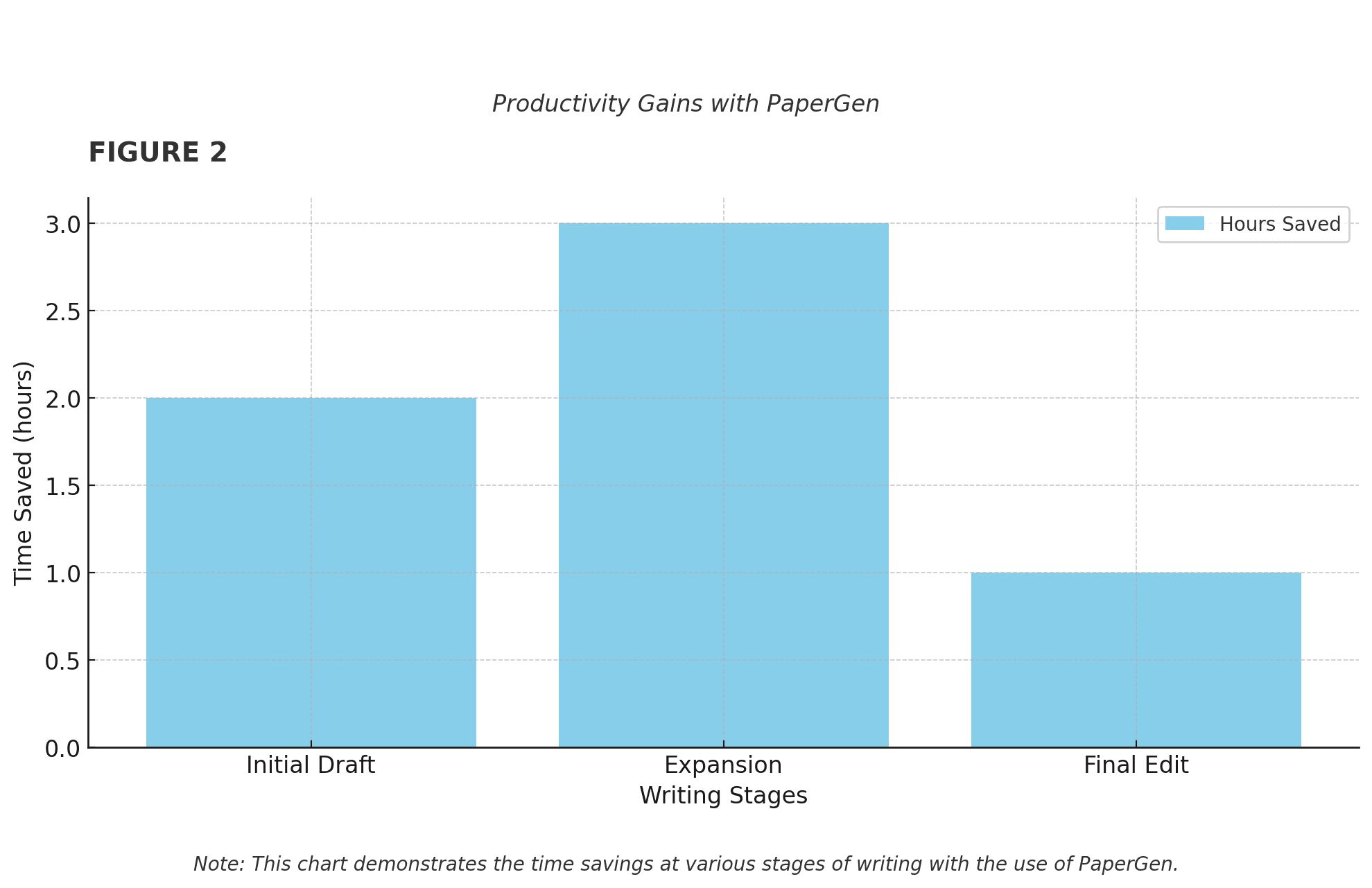
The graph above illustrates the significant time savings achieved at different stages of the writing process when using PaperGen. As we can see, the most substantial gains are realized during the expansion phase, where PaperGen's AI-driven algorithms can rapidly generate additional content while maintaining context and relevance.
PaperGen's comprehensive approach to addressing writer's block and productivity issues makes it an invaluable tool for businesses looking to streamline their content creation processes. By combining the power of AI-driven paper generation with intelligent content expansion, PaperGen empowers professionals to overcome writing challenges and produce high-quality documents efficiently.
AI Writing Assistants in Action
In today's fast-paced business environment, AI writing assistants have emerged as powerful tools to boost productivity and overcome creative hurdles. These innovative solutions, including PaperGen, are revolutionizing the way professionals approach writing tasks across various industries.
Content Marketing Revolution
The content marketing landscape has been transformed by the introduction of AI writing assistants, offering a lifeline to marketers grappling with writer's block and the constant demand for fresh, engaging content. PaperGen.ai, alongside other AI-powered tools, has become an indispensable asset for content creators seeking to maintain a competitive edge in the digital sphere.
Content marketers are leveraging these AI tools to:
1. Generate topic ideas: AI assistants can analyze trends and suggest relevant topics, helping marketers overcome the initial hurdle of ideation.
2. Craft compelling headlines: By utilizing natural language processing, tools like PaperGen can generate attention-grabbing headlines that resonate with target audiences.
3. Expand on key points: AI writing assistants excel at elaborating on core ideas, helping marketers flesh out their content and create more comprehensive pieces.
4. Optimize for SEO: Many AI tools, including PaperGen, incorporate SEO best practices, ensuring that content is not only well-written but also discoverable by search engines.
The impact of AI on content marketing productivity has been significant, with many organizations reporting substantial increases in output and efficiency.
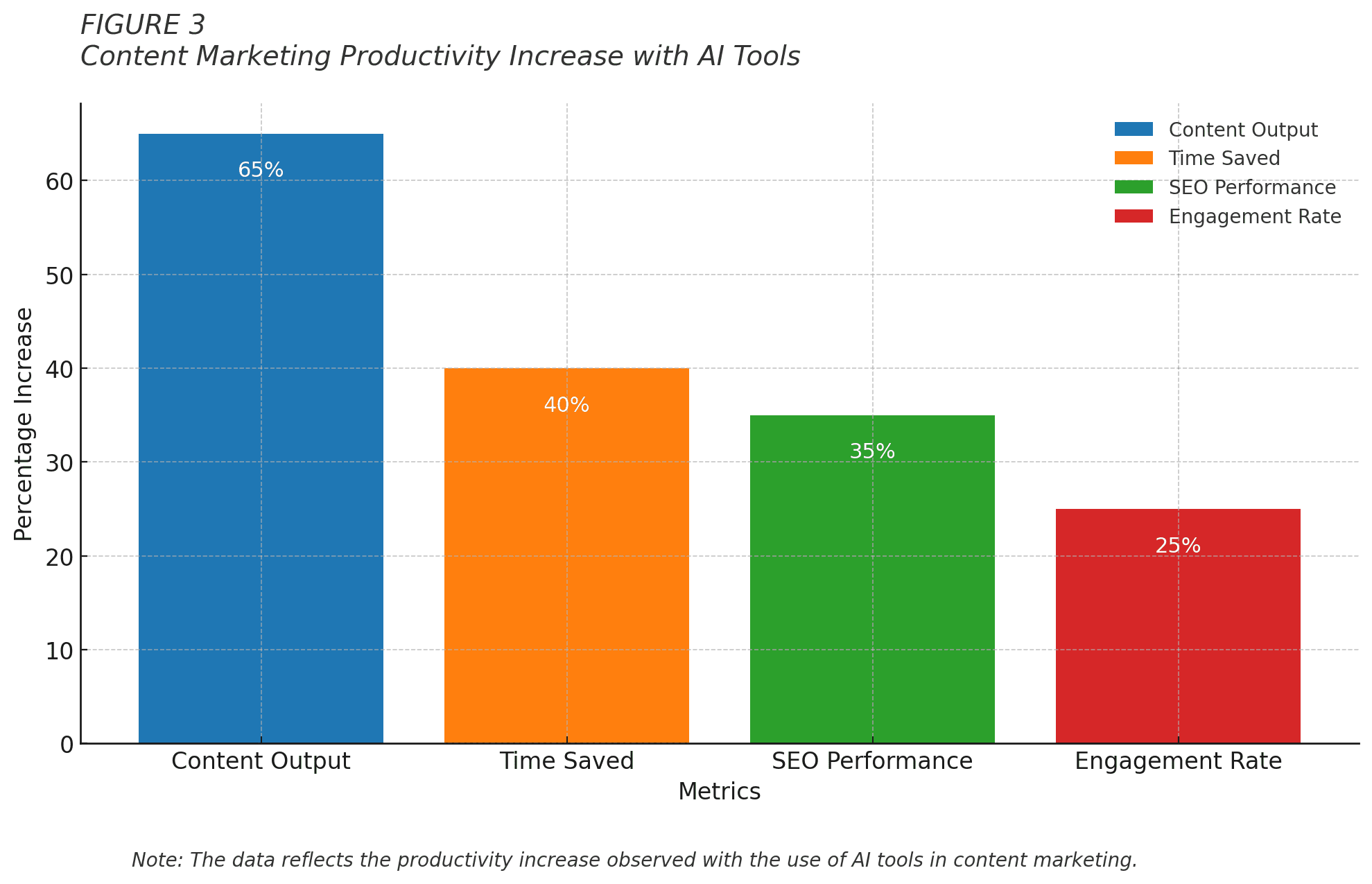
This graph illustrates the transformative effect of AI writing assistants on various aspects of content marketing, highlighting the substantial productivity gains achieved through their implementation.
Academic Writing Support
In the realm of academia, AI writing assistants like PaperGen have become valuable allies for students and researchers alike. These tools offer support throughout the writing process, from initial research to final polishing, helping to overcome common challenges in academic writing.
Key applications of PaperGen and similar AI tools in academic writing include:
1. Literature review assistance: AI can help summarize and synthesize large volumes of research, aiding in the creation of comprehensive literature reviews.
2. Outline generation: By analyzing research topics and key points, AI assistants can suggest structured outlines for academic papers.
3. Paper expansion: PaperGen's paper expander feature is particularly useful for elaborating on complex ideas and ensuring thorough coverage of topics.
4. Citation and referencing: Many AI tools can assist in formatting citations and managing references, ensuring adherence to academic standards.
5. Language refinement: For non-native English speakers, AI writing assistants can help improve language quality and academic tone.
The adoption of AI writing tools in academia has led to notable improvements in the quality and efficiency of academic writing. However, it's crucial to note that these tools are designed to augment human intelligence rather than replace it entirely.
While AI writing assistants have undoubtedly revolutionized both content marketing and academic writing, it's important to maintain a balance between AI assistance and human creativity. The most effective approach involves using tools like PaperGen to overcome initial barriers and enhance productivity, while relying on human expertise for critical thinking, nuanced analysis, and original insights[(Outset Business 2024)](https://outsetbusiness.com/ai-writing-tools).
Quality Enhancement
Contrary to initial concerns, AI writing tools have not compromised content quality. In fact, PaperGen has been shown to enhance the overall quality of business communications by:
1. Ensuring consistency in tone and style across various documents
2. Reducing grammatical and spelling errors
3. Suggesting improvements in sentence structure and vocabulary
This improvement in quality leads to more effective communication with clients, partners, and internal stakeholders, ultimately contributing to better business outcomes. Pairing tools like PaperGen with expert-led technical writing courses enhances both efficiency and communication effectiveness in technical documentation.
Streamlining Content Creation
PaperGen, an advanced AI-powered paper generator and expander, has revolutionized the way businesses approach content creation. By leveraging natural language processing and machine learning algorithms, PaperGen assists writers in overcoming creative hurdles and producing high-quality content at an unprecedented pace.
Time Efficiency
One of the most significant impacts of AI writing tools like PaperGen on business productivity is the dramatic reduction in time spent on content creation. What once took hours or even days to draft, edit, and refine can now be accomplished in a fraction of the time. This efficiency allows businesses to:
1. Produce more content in less time
2. Respond quickly to market trends and customer needs
3. Allocate human resources more effectively to strategic tasks
Quality Enhancement
Contrary to initial concerns, AI writing tools have not compromised content quality. In fact, PaperGen has been shown to enhance the overall quality of business communications by:
- Ensuring consistency in tone and style across various documents
- Reducing grammatical and spelling errors
- Suggesting improvements in sentence structure and vocabulary
This improvement in quality leads to more effective communication with clients, partners, and internal stakeholders, ultimately contributing to better business outcomes.
Productivity Metrics
The impact of AI writing tools on business productivity can be quantified through various metrics:
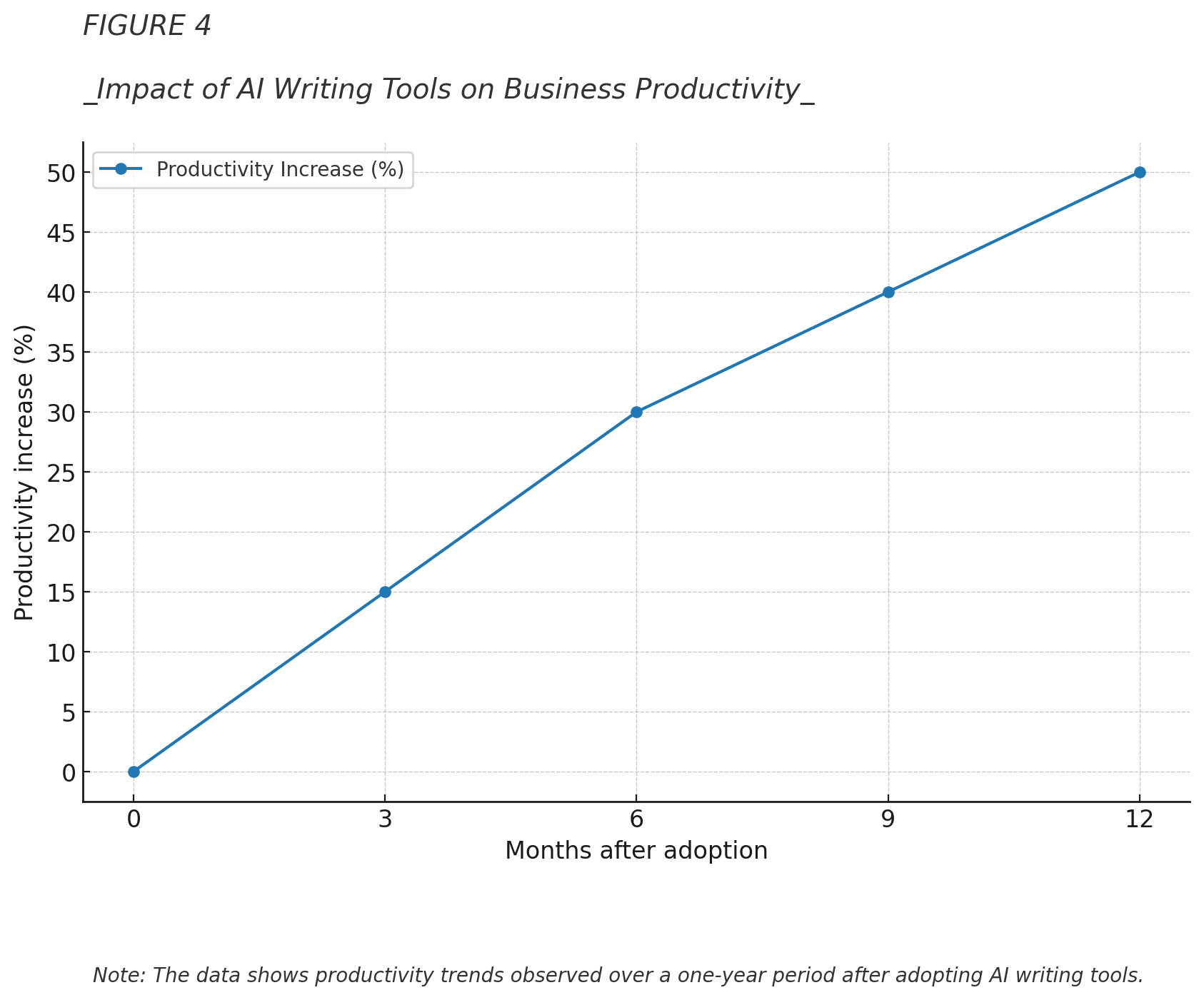
As illustrated in the graph, businesses typically experience a significant boost in productivity within the first year of adopting AI writing tools like PaperGen. This upward trend is attributed to:
1. Faster content generation
2. Reduced time spent on revisions
3. Improved collaboration through standardized writing processes
Cost-Effectiveness
The adoption of PaperGen and similar AI writing tools has proven to be a cost-effective strategy for businesses. By automating certain aspects of the writing process, companies can:
- Reduce the need for extensive editing and proofreading services
- Minimize the time spent on training new writers
- Allocate resources more efficiently across different departments
The return on investment (ROI) for implementing AI writing tools is often realized within the first few months of adoption, making it an attractive option for businesses of all sizes.
Enhancing Creativity and Innovation
Contrary to the misconception that AI might stifle creativity, tools like PaperGen have been found to enhance creative output. By handling routine writing tasks and providing intelligent suggestions, PaperGen frees up cognitive resources for writers to focus on more complex, creative aspects of content creation. This synergy between human creativity and AI assistance has led to:
- More innovative marketing campaigns
- Improved product descriptions and technical documentation
- Enhanced storytelling in business communications
Overcoming Language Barriers
In an increasingly globalized business landscape, AI writing tools have played a crucial role in overcoming language barriers. PaperGen's ability to generate and expand content in multiple languages has enabled businesses to:
- Expand into new markets more easily
- Improve communication with international clients and partners
- Create localized content more efficiently
This capability has significantly contributed to the productivity of businesses operating on a global scale.
Future of AI in Creative Writing
As we look ahead to the future of AI in creative writing, tools like PaperGen are poised to revolutionize the way authors approach their craft. The integration of advanced AI technologies into the writing process is expected to bring about significant changes, enhancing productivity and creativity while presenting new challenges and opportunities for writers across various genres.
Enhanced Language Models and Content Generation
Future iterations of AI writing assistants, including PaperGen, are likely to feature increasingly sophisticated language models. These advancements will enable the generation of more nuanced, contextually appropriate, and stylistically diverse content. Writers using these tools may find themselves with an unprecedented ability to expand their ideas rapidly, turning brief outlines into fully-fledged papers or stories with remarkable ease.
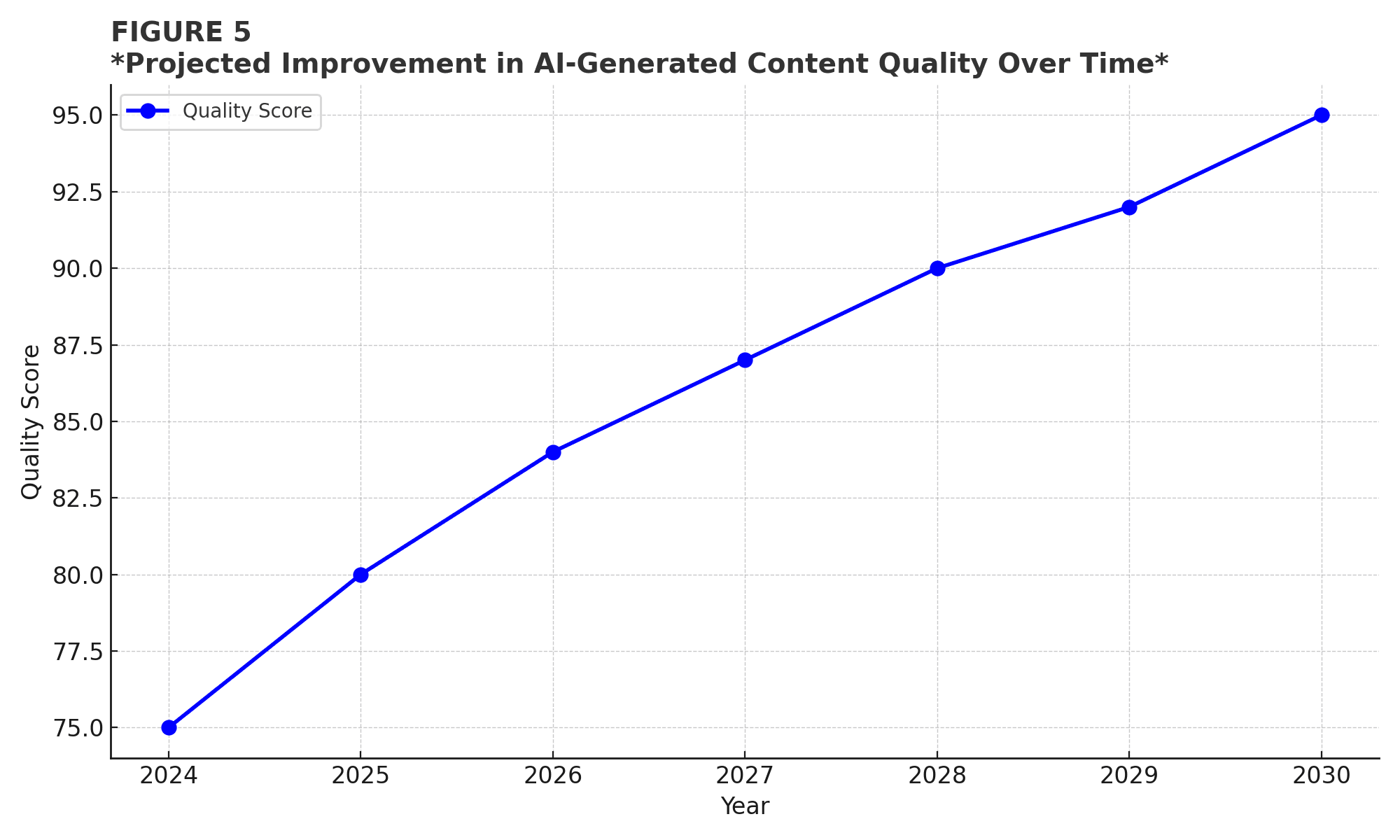
Personalized Writing Assistance
Future AI writing tools are expected to offer highly personalized assistance, adapting to individual writing styles and preferences. PaperGen and similar platforms may develop the capability to learn from a writer's body of work, offering suggestions and expansions that align closely with the author's unique voice. This personalization could extend to genre-specific assistance, providing tailored support for academic papers, fiction, poetry, or technical writing.
Collaborative AI-Human Writing
The future of creative writing may see a shift towards more collaborative processes between AI and human authors. Tools like PaperGen might evolve to become active partners in the writing process, offering real-time suggestions, alternative phrasings, and even plot developments. This collaboration could lead to new forms of storytelling and academic writing, where the boundaries between human and AI-generated content become increasingly blurred.
Ethical Considerations and Originality
As AI becomes more integral to the creative writing process, the industry will need to grapple with evolving ethical considerations. Questions of originality, copyright, and the definition of authorship may need to be reevaluated. Future versions of PaperGen and similar tools will likely incorporate features to ensure transparency about AI involvement and to help maintain the integrity of human creativity.
Integration with Research and Data Analysis
For academic and non-fiction writing, future AI tools are expected to offer seamless integration with research databases and data analysis capabilities. PaperGen might evolve to not only generate and expand text but also to incorporate relevant citations, analyze data sets, and even suggest visual representations of information, streamlining the entire process of paper creation.
Multilingual and Cross-Cultural Writing Support
As global communication continues to grow in importance, future AI writing assistants are likely to offer advanced multilingual support. PaperGen could develop capabilities to assist writers in crafting content that is not only linguistically accurate across multiple languages but also culturally appropriate and sensitive.
Virtual Reality and Immersive Writing Experiences
Looking further into the future, we might see the integration of AI writing tools with virtual reality technologies. Imagine using PaperGen in a fully immersive environment where writers can visualize their stories or academic concepts in 3D space, interacting with AI-generated elements to craft more engaging and vivid narratives or explanations.

Challenges and Opportunities
While the future of AI in creative writing holds immense potential, it also presents challenges. Writers and educators will need to adapt to these new tools, finding ways to leverage AI assistance while maintaining the human elements that make writing powerful and unique. The key to success will lie in viewing AI tools like PaperGen not as replacements for human creativity, but as powerful allies in the creative process.
In conclusion, the future of AI in creative writing, exemplified by tools like PaperGen, promises to be transformative. As these technologies continue to evolve, they will offer writers unprecedented support in generating, expanding, and refining their work. However, the true art of writing will remain a fundamentally human endeavor, with AI serving as an increasingly sophisticated and indispensable tool in the writer's arsenal.



